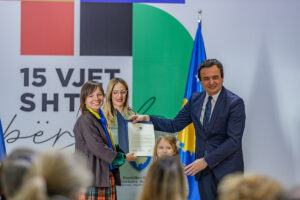In a world gripped by geopolitical tensions and shifting alliances, the choices made by nations are often measured against the values they uphold and the allies they align with. Yet, the recent actions and engagements of Ukrainian President Volodymyr Zelensky have left observers scratching their heads and questioning the consistency of Ukraine’s foreign policy, particularly when it comes to its relationship with Serbia.
Zelensky’s portrayal of his meeting with Serbian President Aleksandar Vučić as “sincere, open, and fruitful” raises eyebrows. Such diplomatic pleasantries are often used to veil the true nature of discussions, and in this case, they seem to camouflage a concerning willingness to turn a blind eye to Serbia’s actions that directly contradict Ukraine’s interests and principles.
At the forefront of this puzzling engagement is Serbia’s resolute refusal to impose sanctions on the Russian Federation, even in the face of the ongoing conflict between Ukraine and Russia. While other countries in the Western Balkans have taken a stand against Russia’s aggression, Serbia’s obstinacy paints a portrait of a nation content to sidestep its obligations to international solidarity. This reluctance not only undermines Ukraine’s struggle for sovereignty but also questions the genuineness of Serbia’s commitment to regional stability.

Equally alarming is Serbia’s apparent open door to Russian citizens and oligarchs, some of whom have been accused of financially aiding Vladimir Putin’s belligerence against Ukraine. While the rest of the world seeks to isolate and condemn those contributing to Putin’s atrocities, Serbia offers them an unhindered pathway, casting doubt on its role as a responsible international actor.
However, the most egregious disregard for Ukraine’s plight lies in Serbia’s hosting of Russian Wagner military mercenaries on its soil. These mercenaries have blood on their hands, with their involvement in the killing of Ukrainian civilians staining Serbia’s conscience. By sheltering these perpetrators of violence, Serbia sends a chilling message that it is willing to sacrifice the innocent lives of Ukrainians for its own questionable interests.
Even more astonishing is Serbia’s failure to denounce Russia’s illegal invasion of Ukraine. As neighbouring countries raised their voices in protest, Serbia remained oddly muted. This silence speaks volumes about its priorities and calls into question its commitment to upholding international law and defending the sovereignty of its fellow nations.
The pièce de résistance of Ukraine’s bewildering dance with Serbia is the revelation that the latter has inked a treaty aligning its foreign policy with Moscow’s interests. This move is not just a diplomatic manoeuvre; it’s a declaration of intent to cosy up to the very nation responsible for sowing chaos in Ukraine. It is an affront to the principles of international cooperation and peace and a direct snub to nations that look to Ukraine for leadership in the face of Russian aggression.
Meanwhile, on the other side of the Balkans, the Democratic Republic of Kosovo presents a contrasting narrative. Kosovo has unflinchingly stood with Western democracies, imposing sanctions on Russia and vociferously denouncing its crimes against humanity. This small nation’s resolute stance in the face of adversity shines a spotlight on Ukraine’s questionable choices.
Kosovo’s commitment to counter Russian propaganda and provide a safe haven for Ukrainian journalists is not just commendable; it’s a shining example of responsible diplomacy. Ukraine’s inexplicable partnership with Serbia, a host of Russia Today and Sputnik, infamous mouthpieces of Putin’s propaganda machine, raises questions about its commitment to truth and the integrity of information dissemination.
It’s a bitter pill to swallow that Ukraine, a nation that has itself been a victim of foreign aggression, has failed to recognize the independent Republic of Kosovo. This failure is not only a diplomatic oversight but also a slap in the face of a nation that champions the values of freedom and self-determination.
President Zelensky, the perplexing choices you have made in engaging with Serbia are a cause for concern. The glaring contradictions between Ukraine’s principles and Serbia’s actions cast a shadow on your leadership’s credibility. How can the world trust a nation that appears to turn its back on its own values and allies itself with those who undermine the pursuit of justice and peace?
In a time when strong leadership is needed to navigate the treacherous waters of international relations, it is imperative that Ukraine reassess its alignment and engagements. It’s time to weigh the cost of diplomatic niceties against the value of upholding principles, supporting allies that genuinely share Ukraine’s aspirations, and truly standing up against those who threaten the global order.
In the grand tapestry of geopolitics, the choices we make today ripple through the pages of history. Ukraine’s choice to waltz with Serbia may prove to be a discordant note in an otherwise harmonious struggle for liberty and justice.

